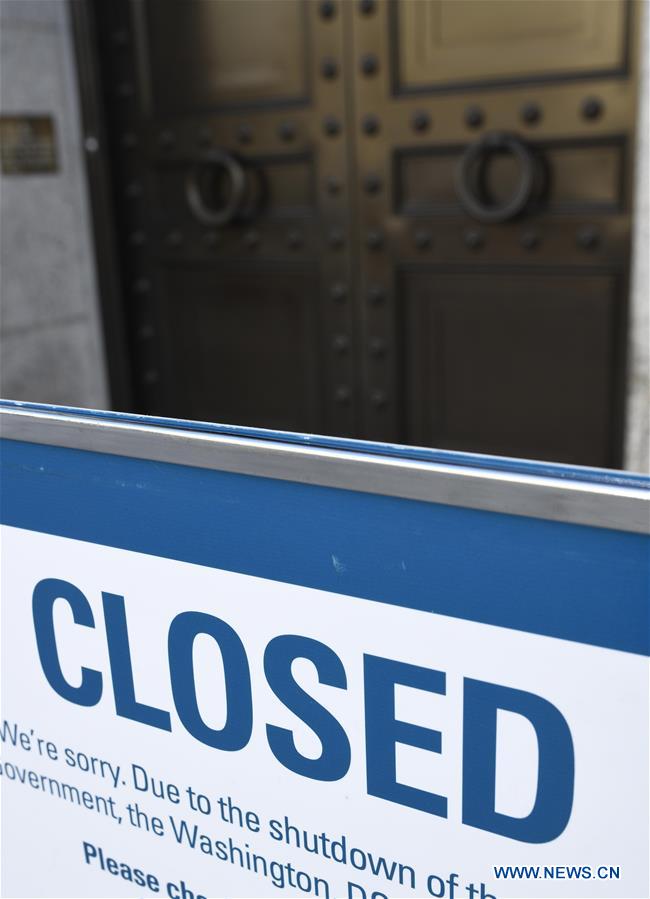
Photo taken on Dec. 22, 2018 shows the U.S. National Archives building in Washington D.C., the United States. Due to a partial government shutdown, National Archives' facilities were closed on Saturday. U.S. President Donald Trump said Saturday that he was negotiating with the Democrats to end a partial government shutdown, but "it could be a long stay" due to continued discrepancy on his long-time demand for a border wall. (Xinhua/Liu Jie)
WASHINGTON, Dec. 23 (Xinhua) -- The White House Office of Management and Budget Director Mick Mulvaney said on Sunday that the ongoing partial government shutdown would likely extend into the new year.
"I don't think things are going to move very quickly here for the next couple days," Mulvaney said during an interview on Fox News Sunday. "It's very possible this shutdown will go beyond the 28th and into the new Congress." The new Congress is set to take office on Jan. 3.
Mulvaney, also the incoming Acting White House Chief of Staff, said the partial closure will likely continue because President Donald Trump "refuses to go along to get along" on his border wall and House Democratic Leader Nancy Pelosi intentionally stalling negotiation efforts.
The partial government shutdown, which began at midnight Friday, closed about a quarter of federal offices, affecting nine Cabinet-level U.S. departments and dozens of agencies, including the departments of Homeland Security, Transportation, Interior, Agriculture, State and Justice.
The U.S. House and Senate convened Saturday noon on Capitol Hill, but didn't break the deadlock over the funding of the president's demand for a 5-billion-U.S.-dollar U.S.-Mexico border wall, a centerpiece of Trump's 2016 campaign.
Shortly after the gathering, Senate Majority Leader Mitch McConnell announced that "no further votes will occur until the president and Senate Democrats have reached an agreement to resolve this."
Trump said earlier Saturday that he was negotiating with the Democrats to end the partial government shutdown, but "it could be a long stay" due to ongoing disagreements over his demand to build a border wall.
The Senate will meet in a pro forma session on Monday and will return on Thursday and consider business if a deal is reached on government funding. A pro forma session, which typically only lasts a few minutes, doesn't involve votes, but senators are able to clear legislation by unanimous consent.
"What we do support -- Democrats and Republicans -- is real, effective border security. But not a wall. The wall is President Trump's bone to the hard right," Senate Democratic Leader Chuck Schumer said Saturday, adding that Democrats had proposed 1.3 billion dollars for border security.
"Democrats have always been for smart and effective ways to secure our border," he said. "We are pushing for technology, like drones and sensors, and inspection equipment."
Trump tweeted early Sunday that while "drones and all of the rest are wonderful and lots of fun," only a "good old fashioned wall" is truly effective.
Earlier in the past week, senators passed a stopgap spending bill that did not include the 5 billion dollars Trump is seeking, and the president later said he would not sign it. The House passed a temporary spending bill late Thursday that included the border wall money but couldn't get enough votes to clear the Senate on Friday.
A few hours after the shutdown began, Office of Management and Budget General Counsel Mark Paoletta said Saturday afternoon in a conference call with reporters that the budget office was striving to make the shutdown "as painless as possible" with a "minimum disruption" for Americans.











